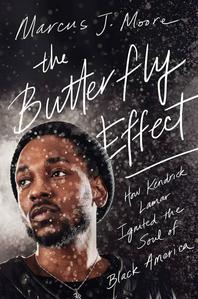
|
|
| photo: Moyo Oyelola | |
Journalist and music critic Marcus J. Moore is a contributing writer with the Nation and a contributing editor with Bandcamp Daily. He has covered soul, jazz, hip-hop and rock at the New York Times, Pitchfork, Entertainment Weekly, the Washington Post, NPR, Rolling Stone and the Atlantic, among others. His debut book, The Butterfly Effect: How Kendrick Lamar Ignited the Soul of Black America (Atria; reviewed below) is the first in-depth cultural biography of the multi-Grammy and Pulitzer Prize-winning rapper Kendrick Lamar.
In your acknowledgments, you write: "I've been asked this question a lot over the past two years: Why Kendrick Lamar? The answer is always simple: Why not? Though he isn't done creating (as of this writing), there's no denying the grand impact he's had on music and Black culture over the past decade. His story is worth celebrating, so why not give him flowers now?" Was it difficult to tell this story now, while Lamar is still alive and still creating?
There were a few (though not many) skeptics in the public space who thought it was too early for a Kendrick Lamar biography. I disagreed; I thought it was the perfect time for this. For too long, historians have tried to reduce or erase Black history, even though we built this country for free. There's this notion that people either need to be old or deceased before they can get their flowers. That doesn't make sense to me. We should uplift each other all the time. You never know what someone is going through, or when tragedy might strike. Far too often, when legends transition, we flood social media with messages of "gone too soon" and "they didn't get the credit they deserved," but there's a whole generation of living legends whose stories should be captured in books.
In The Butterfly Effect, you tie together threads from the specifics of Kendrick Lamar's life and art to broad movements like Black Lives Matter, the quest for greater gun control in the U.S. and racist "Make America Great Again" narratives. So much of Lamar's impact is due to ways he does this in his lyrics. How did your background as a music critic and journalist prepare you for this work?
I had to tap into all aspects of my career to write this book. There was some local reporting, business reporting, education reporting, political reporting and music analysis. I had to remember the old days of working a beat and developing sources. Then, of course, I tapped into music criticism to unpack the narrative of Kendrick's music. I also wanted the book to feel like a casual conversation between me and the reader. I wanted the narrative to be incredibly clear, so at the end of it, there'd be no mistaking how Kendrick became Kendrick, and how [record label] TDE influenced the world. I wanted to dissect the artistry and walk readers through the rapper's personal and creative evolution.
As for the research process, it wasn't too arduous. I come from a background of "cite your sources!" So I went above and beyond to make sure everyone was credited properly. I also knew that Kendrick and TDE are incredibly private, so the likelihood of speaking with them was slim to none. That said, they still have a story worth telling, so I made sure it was told thoroughly and with nuance and care. I wrote the book like I would a story: I conducted interviews before I started writing, and if I came to a place that required more research or another voice, I made sure I filled the gap. For instance, as I wrote about the history of Compton in chapter two, I didn't want it to be like every other conversation about the town: death, despair, crime, poverty. I thought, "What was Compton like before the '80s?" I reached out to noted club owner Alonzo Williams, who gave me a great interview. He was very gracious with his time.
You interviewed Alicia Garza, a cofounder of the Black Lives Matter movement, about Lamar's anthem "Alright." What was it like talking to someone who has had such a strong impact on our national dialogue and national action, especially in 2020?
It was quite extraordinary. As a veteran journalist who grew up in old-school newsrooms, I've learned that good reporting tells the best story. So this book is nothing without the goodwill of people like Alicia Garza, who didn't know me at all, but still made time to chat. It really meant a lot. Alicia is a kind soul who deserves a ton of credit.
 You write about Lamar's teacher Regis Inge, whose early support of Lamar's writing was critical. Who has been critical in influencing your own writing? Through your music journalism and this book, what do you see or hope your own influence might be on burgeoning writers?
You write about Lamar's teacher Regis Inge, whose early support of Lamar's writing was critical. Who has been critical in influencing your own writing? Through your music journalism and this book, what do you see or hope your own influence might be on burgeoning writers?
I've always been a curious person who couldn't help but look ahead. It started in kindergarten; I was in one reading group but I wanted to be in another, more exciting group. They were spelling big words, and I wanted to do that! My teacher, Mrs. Bielski, made me a deal: if I could spell the word "alligator," she'd let me into the group. I did it and got in. That curiosity only grew stronger in my writing--from high school, to college, to now. As a young reporter in the immediate D.C. suburbs, I was curious about hazardous housing conditions, which disproportionately affected Black people. I was curious about the achievement gap in the Montgomery County public school system. As a music fan, I've always been fascinated by music that's considered alternative or left-of-center. Now, as an author, journalist and editor, I use my platform to spotlight the music I love. Through my work and this book, I want burgeoning writers to know that it's okay to be genuinely curious--that they don't have to adhere to what society pushes them to like.
You said in an interview years ago that if you could interview any musician from any era, you'd interview John Lennon. Would you give the same answer today?
Wow, good pull! Haha. I've changed a lot since then, and while I'm still a Lennon fan, I'd want to interview Nina Simone, Stevie Wonder, Minnie Riperton and Alice Coltrane. When I'm down, their music always makes me feel better.
Can you share a little about what's next for you?
My next book is a cultural biography of hip-hop trio De La Soul. Like the Kendrick book, it's meant to celebrate the artist while also celebrating the culture overall. Unlike The Butterfly Effect, which largely talks about current events, High and Rising is a period piece that begins in the early '80s. It charts the rise of hip-hop in New York City, the formation of De La Soul in Long Island and the ascension of alternative rap in the mainstream marketplace. De La Soul changed the landscape in a lot of ways, but I don't think they've gotten full credit for it. --Katie Weed, freelance writer and reviewer

